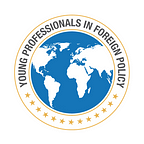Water Diplomacy
Posted by Alicia Fawcett
On May 24, 2017, Young Professionals in Foreign Policy — New York and The Gallery Space at NYU Wagner hosted a discussion on Water Diplomacy and its concern for global discussion. Thought leaders George H. Lewis and Gül Özerol shared their experiences, work and projects with young professionals in promoting the importance of water.
Gül Özerol (PhD in Innovation and Governance for Sustainable Development) is an assistant professor at the University of Twente and Senior Water Editor at Fanack. Her work revolves around the political, institutional and social aspects of natural resource governance, with a particular focus on water, land and energy. She has been involved in research and consultancy projects in Europe, the Middle East and North Africa (MENA), and has been researching water issues in the MENA region for more than 10 years. Her current projects in the MENA region include the Palestinian-Dutch Academic Cooperation Programme on Water (PADUCO) and the editorial management of Fanack Water.
During the event, she discussed water cooperation in the MENA region along with the contributions of Fanack Water to raising the awareness of youth on water topics. Fanack Water primarily targets young readers between the ages of 18 and 35, with the aim of providing accessible, balanced and informed analysis of water issues in the MENA region. Fanack’s content is made up of country files, special reports, opinion pieces and interviews with local experts.
Gül opened the discussion by questioning the audience, “Does water create conflict, cooperation, or both?” She then quoted “Egyptian Foreign Minister Boutros Boutros-Ghali with “The next war in the Middle East will be fought over water, not politics. She gave everyday examples of this question for the Nile River (Egypt vs. upstream countries), Jordan (Israel vs. Palestine, Jordan, Lebanon, and Syria), and the Euphrates and Tigris Rivers (Turkey vs. (Syria and Iraq). She also discussed the importance of water in political conflicts, citing examples where water is being used as a weapon: in the Syrian war, amidst the rise of ISIS, and in the Israeli-Palestinian conflict.
Digging deeper into the structure of water diplomacy, Gül used the three-tier diplomacy tracks, which helped the audience understand the political context in which water diplomacy discussions occur: Track 1 is characterized by official dialogue on water, with high level political and military leaders who conduct peace talks and negotiations. Track 2 is an unofficial dialogue between individuals and private groups, where the sharing of ideas form political policies. Lastly, Track 3 is where unofficial dialogue between individuals and communities come together to participate in the negotiation process.
Through her professional work and experiences, Gül discovered water awareness and cooperation is often more feasible and useful on the local level than at the national and international levels. The local level is cooperative through citizen awareness of water quantity and quality, and grass root organizations are efficient in mobilizing collective action. National and international conversation on water continues to be ineffective and insufficient: data is scattered across organizations and the dissemination of knowledge is inconsistent across nations. She believes effective cooperation on water issues could be achieved when transdisciplinary research, national cooperation with the water sector, and international academic cooperation are all being exercised, as illustrated with the case of PADUCO.
Gül shared her opinion that solutions for water conflict include communication, collaboration, and co-creation processes. These actions will help develop equitable and sustainable solutions to cross-border water problems. The goal is to shift water priorities away from national objectives and back to regional values of the communities. One way to do this is to create awareness around the cultural and nature heritage, and the environment. The international community should address solutions for large-scale, long-term initiatives and upscale them to Track 1. Cooperative discourses of environmental and cultural organizations should stress regional values over national boundaries and barriers. There should also be further cooperation between universities and non-academic stakeholders, online media for accessible knowledge in Arabic and in other Middle Eastern languages.
Quotes during the discussion:
“The next war in the Middle East will be fought over water, not politics.” — Egyptian Foreign Minister Boutros Boutros-Ghali
“If we are not careful, future wars are going to be about water and not about oil.” — former UN Secretary General Kofi Annan
“Water often acts as a catalyst to cooperation, even between bitter enemies.” — Transboundary Freshwater Dispute Database
George H. Lewis, an internationally acclaimed British artist, painter, photographer and speaker, introduced the concept of water consciousness and the need to address its cosmo and spiritual properties. After spending a significant amount of time in the Middle East, George stated that Eastern cultures have shown initiative and leadership in productive ways to perceive water and nature. The event venue was decorated with Lewis’ art, which provided a meditation on the nexus between the cosmos, the human spirit, and bodies of water. At once alluring and menacing, his depictions of oceanic and river views explore the transformative power of water and the intrinsic reciprocity between our treatment of ecosystems and our collective consciousness.
After viewing his stunning artwork, he explained his reasons behind painting water. Simply put, he believes the force of water has the ability and power to sustain humans if they will nurture and treat it with respect
The discussion took place at NYU Wagner’s Gallery Space, which has a Spring 2017 exhibition featuring Lewis’ “The Consciousness of Water”, on display through July 28. “The Consciousness of Water” is curated by Frankie Crescioni-Santoni. For more information, please contact wagner.gallery@nyu.edu or 212.998.7401.
